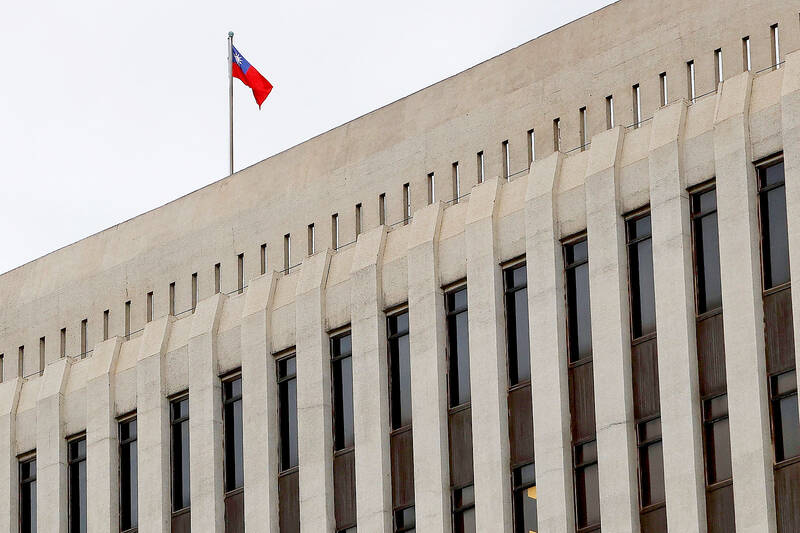A triple whammy of tightening factors is pushing banks to scale back purchases of central bank deposits at the fastest pace on record, a sign that market liquidity is shrinking.
Monetary policy tightening, a seasonal impact from tax payments, and an investment boom that is drawing cash into stocks are all coming at the same time.
That has cut demand for negotiable certificates of deposits (NCDs) and certificates of deposits (CDs) issued by the central bank — a key tool to manage liquidity as onshore banks use them to store excess cash.

Photo: Ann Wang, Reuters
Banks have cut NT$416.1 billion (US$12.85 billion) of purchases so far this month, the biggest monthly decline since at least 2002, when Bloomberg began tracking the data.
The total amount of outstanding NCDs and CDs has fallen to about a five-year low.
“As Taiwan’s central bank sticks with a tightening stance, while the hype around local stock and foreign bond ETFs [exchange traded funds] continues to attract money, banks are left with less accessible funds in hand,” Masterlink Securities Investment Advisory (元富投顧) economist Anita Hsu said.
The central bank increased policy rates in March and on June 13 said that it would raise the reserve requirement ratio (RRR) for banks next month.
That, coupled with people pulling money away from saving accounts to pay taxes or invest in stocks, resulted in tighter liquidity for lenders and hurt their appetite for the NCDs, said a central bank official who declined to be named as the person was not authorized to comment publicly.
With money market rates already ticking up and the reserve requirement ratio hike set to take effect on July 1, deposit purchases might not recover soon, the official said.
An auction on Wednesday of the central bank’s two-year NCDs recorded an average yield of 1.461 percent, the highest in more than two years.
Analysts expect short-term rates and interest rate swaps (IRS) — a measure of policy rate expectations — to rise further on the possibility that the central bank would keep raising borrowing costs.
That might mean liquidity continues to leave the system. One-year IRS yesterday reached the highest level since 2014.
“We do not rule out further tightening, via policy rate or RRR or both, if the real-estate market continues to overheat,” said Ju Wang (王菊), head of greater China forex and rates strategy at BNP Paribas SA. “We look for opportunities to re-enter IRS steepeners.”

WEAKER ACTIVITY: The sharpest deterioration was seen in the electronics and optical components sector, with the production index falling 13.2 points to 44.5 Taiwan’s manufacturing sector last month contracted for a second consecutive month, with the purchasing managers’ index (PMI) slipping to 48, reflecting ongoing caution over trade uncertainties, the Chung-Hua Institution for Economic Research (CIER, 中華經濟研究院) said yesterday. The decline reflects growing caution among companies amid uncertainty surrounding US tariffs, semiconductor duties and automotive import levies, and it is also likely linked to fading front-loading activity, CIER president Lien Hsien-ming (連賢明) said. “Some clients have started shifting orders to Southeast Asian countries where tariff regimes are already clear,” Lien told a news conference. Firms across the supply chain are also lowering stock levels to mitigate

Six Taiwanese companies, including contract chipmaker Taiwan Semiconductor Manufacturing Co (TSMC, 台積電), made the 2025 Fortune Global 500 list of the world’s largest firms by revenue. In a report published by New York-based Fortune magazine on Tuesday, Hon Hai Precision Industry Co (鴻海精密), also known as Foxconn Technology Group (富士康科技集團), ranked highest among Taiwanese firms, placing 28th with revenue of US$213.69 billion. Up 60 spots from last year, TSMC rose to No. 126 with US$90.16 billion in revenue, followed by Quanta Computer Inc (廣達) at 348th, Pegatron Corp (和碩) at 461st, CPC Corp, Taiwan (台灣中油) at 494th and Wistron Corp (緯創) at

NEGOTIATIONS: Semiconductors play an outsized role in Taiwan’s industrial and economic development and are a major driver of the Taiwan-US trade imbalance With US President Donald Trump threatening to impose tariffs on semiconductors, Taiwan is expected to face a significant challenge, as information and communications technology (ICT) products account for more than 70 percent of its exports to the US, Chung-Hua Institution for Economic Research (CIER, 中華經濟研究院) president Lien Hsien-ming (連賢明) said on Friday. Compared with other countries, semiconductors play a disproportionately large role in Taiwan’s industrial and economic development, Lien said. As the sixth-largest contributor to the US trade deficit, Taiwan recorded a US$73.9 billion trade surplus with the US last year — up from US$47.8 billion in 2023 — driven by strong

ASE Technology Holding Co (ASE, 日月光投控), the world’s biggest chip assembly and testing service provider, yesterday said it would boost equipment capital expenditure by up to 16 percent for this year to cope with strong customer demand for artificial intelligence (AI) applications. Aside from AI, a growing demand for semiconductors used in the automotive and industrial sectors is to drive ASE’s capacity next year, the Kaohsiung-based company said. “We do see the disparity between AI and other general sectors, and that pretty much aligns the scenario in the first half of this year,” ASE chief operating officer Tien Wu (吳田玉) told an